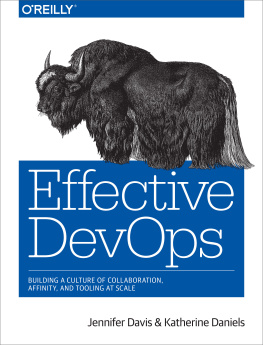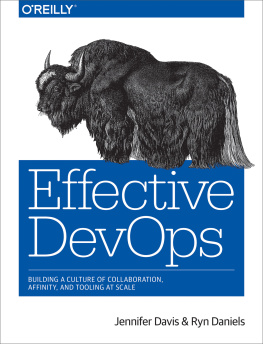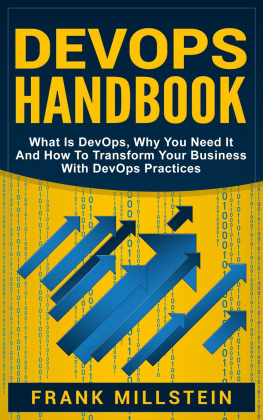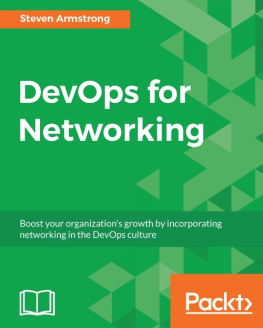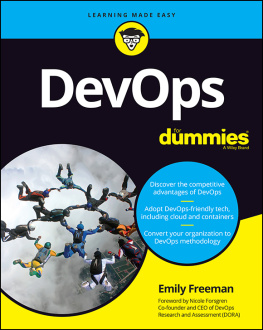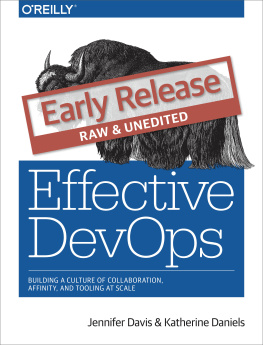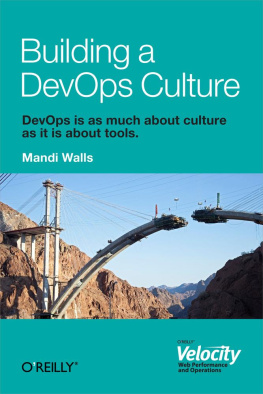Praise for Effective DevOps
Excellent reading for anyone interested in understanding
devops and how to foster a devops culture.
James Turnbull, CTO at Kickstarter
Devops is not another tech movement that can be deferred and discarded;
it has tentacles throughout the organization from concept to cash. Anyone who has watched their cost of building new features increase, or has lived through the
frustrations of unplanned downtime, will understand the intrinsic values
espoused by the devops movement.
"Effective DevOps is the most comprehensive book Ive seen on the topic; and one that is completely digestible and applicable for those within technology and the lines of business. I particularly enjoyed the sections debunking common myths and memes regarding devops; such as it being cost prohibitive, only applicable to startups, or that its a position to be filled. Such resounding rebuttals help preserve the spirit of devops and keeps commoditization of the movement at bay. This book will become recommended
reading for any organization that conceives, develops, and deploys software.
Nivia S. Henry, Sr. Agile Coach at Summa
High performance organizations see technology as a strategic capability. However, they understand that technology is often not the most challenging dimension. Culture matters. How well your organization collaborates, experiments and seeks to learn and share knowledge dictates the level it not only accepts but will achieve. In this book, Jennifer and Katherine have outlined the necessary conditions to create a system of work for your business to develop its own path towards continuous improvement, growth and transformation. Read it, reflect on it, then deploy it.
Barry OReilly, Founder and CEO, ExecCamp and coauthor of Lean Enterprise: How High Performance Organizations Innovate At Scale (OReilly)
Careful attention to the history and traditions of the devops movement
meets detailed advice and empathy for todays practitioners.
Bridget Kromhout, Principal Technologist at Pivotal
"Effective DevOps is a flat-out impressive collection of the bits and pieces that make up what is essentially the largest shift in technical work since the Agile Manifesto was published. It brings together stories and resources from diverse resources that feel worlds apart and presents everything in an approachable manner, and covers not just tools but the culture, behavior, and work pattern characteristics that are so
essential for successful technology teams.
Mandi Walls, Technical Community Manager at Chef
and author of Building a DevOps Culture (OReilly)
Everyone knows culture is important in the context of devops, but weve lacked a
book-length reference into this vital topic. Effective DevOps is a broad, deep inquiry
into human factors that should be studied by every manager who wants to
buildhigh performing technical teams and organizations.
Jez Humble, coauthor of
Continuous Delivery (Addison-Wesley) and Lean Enterprise (OReilly)
Effective DevOps
by Jennifer Davis and Katherine Daniels
Copyright 2016 Jennifer Davis and Katherine Daniels. All rights reserved.
Printed in the United States of America.
Published by OReilly Media, Inc. , 1005 Gravenstein Highway North, Sebastopol, CA 95472.
OReilly books may be purchased for educational, business, or sales promotional use. Online editions are also available for most titles (http://safaribooksonline.com). For more information, contact our corporate/institutional sales department: 800-998-9938 or corporate@oreilly.com .
- Editor: Brian Anderson
- Production Editor: Colleen Lobner
- Copyeditor: Rachel Monaghan
- Proofreader: Jasmine Kwityn
- Indexer: WordCo Indexing Services
- Interior Designer: David Futato
- Cover Designer: Randy Comer
- Illustrator: Rebecca Demarest
Revision History for the First Edition
- 2016-05-23: First Release
See http://oreilly.com/catalog/errata.csp?isbn=9781491926307 for release details.
The OReilly logo is a registered trademark of OReilly Media, Inc. Effective DevOps, the cover image of a wild yak, and related trade dress are trademarks of OReilly Media, Inc.
While the publisher and the authors have used good faith efforts to ensure that the information and instructions contained in this work are accurate, the publisher and the authors disclaim all responsibility for errors or omissions, including without limitation responsibility for damages resulting from the use of or reliance on this work. Use of the information and instructions contained in this work is at your own risk. If any code samples or other technology this work contains or describes is subject to open source licenses or the intellectual property rights of others, it is your responsibility to ensure that your use thereof complies with such licenses and/or rights.
978-1-491-92630-7
[LSI]
Foreword by John Allspaw
There is a sea change happening in software development and operations, and it is not simply the introduction of a new word into our lexiconits much more than that. It is a fundamental shift of perspective in the design, construction, and operation of software in a world where almost every successful organization recognizes that software is not something you simply build and launchit is something you operate.
What makes this shift unique is that its more encompassing, more holistic, and more reflective of the reality that engineering teams face on a daily basis. Long gone are the days that manufacturing and assembly-line metaphors could be used in software development and operations. Long gone are the days that products are things that are designed, planned, and then finally launched. There is no finally anymore. There is only an endless cycle of adaptation, change, and learning.
What Katherine and Jennifer have laid out in this volume is a myriad of threads to pull on as engineers in teams and organizations cope with the complexity that comes with trying to make their work simple.
Katherine and Jennifer do not paint a picture of one-size-fits-all or deterministic solutionism. Instead, they describe a landscape of topic areas, practices, and observations of teams and organizations that understand the idea that at the heart of good products, good user experiences, and good software is the elegantly messy world of human cooperation, thoughtful critique, effective collaboration, and judgment.
In 2009, my friend Paul Hammond and I gave a presentation at OReillys Velocity Conference entitled 10+ Deploys a Day: Dev and Ops Cooperation at Flickr. While some of the material was about perspectives on continuous deployment, many chose to focus on the 10+ Deploys part rather than the Cooperation part. I believe it is a mistake to think that the technology or hard parts can be seen as somehow distinct or separate from the social and cultural soft partsthey cannot. They are inextricably linked and equally critical to success. In other words, people and process influence tools and software in more ways than most are willing to admit or even know.
My strong advice to readers: do not make the mistake of thinking that technology is not about people and process, first and foremost. Your competition will eat you alive the second you start thinking this.
These topics of concern are not found in typical computer science curriculums, nor are they found in typical professional leadership and development courses. These topics are born out of the pragmatic maturity that only hard-won work in the field can produce.

